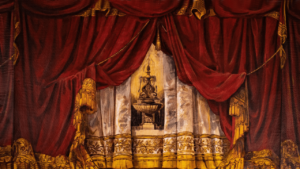
Criticism on Fridays: Revising the Canon
Accepting the Changing Landscape of the Opera Industry
By Polina Lyapustina(Art by Zuleyka V. Benitez, used with permission from Haymarket Opera Company)
Every Friday, Polina Lyapustina delivers a short essay on some of the most sensitive topics in the industry with the intent of establishing a dialogue about the opera world and its future. The choice of topics discussed, how they are researched, and how they are portrayed is conducted independently of OperaWire’s editors.
This week I found myself longing for something new to watch. This might be caused by the New Yorker’s review of “Götterdämmerung” staged at a parking lot in Detroit or the massive feedback from musicians on last week’s essay. Whatever the reason, the feeling of something promising burned inside, and I started to believe that the new opera I was claiming in last week’s essay might already be here.
Just a couple of months ago, returning to the theaters seemed the only salvation for the industry. And like everyone else, I was waiting for the new season. Everything has changed this year, and I believed it would remain “different” for years after the pandemic.
But after the season announcements in the summer, I realized that they did not meet any expectations of reform and offered traditional theatre again. While we learn and adapt, the heavy industry giants are not capable of anything other than searching for new types of income to support themselves (not the art or even the musicians).
The old gods failed the 2020 challenge.
Yes, I’m saying the opera houses have, over the years, become a kind of gods who gave jobs and fed artists. The Gods of Valhalla seem an apt comparison. They were the tastemakers. The ones who set the opera world’s agenda. We started to evaluate one’s talent according to the list of theaters in which any one artist has performed. If you sing at the MET, La Scala, or ROH, you’ve reached the stars. And for the audience, theatres (not musicians) became the main source of art.
But like Wotan, challenged by a new order, it has proven difficult for a large theater to break out of its familiar surroundings and turn away from the paved path towards new discoveries (more breakthrough than another production of “La Traviata”).
And when I look at what, let’s say, what the MET offers now, I wonder – are they fighting for art or simply surviving? Of course, everyone needs to survive, but I couldn’t get rid of the thought, that I expected more from such a giant that’s meant to lead the direction of the entire industry. But that direction merely forced what was once a secondary product — past opera transmissions — to become a replacement for the live performance. Just like that. Without trying to acquire or create added value for the audience. The crazy thing? The audience accepted. The MET is offering up an online recital series, admittedly with famous opera stars, but so are hundreds of opera companies around the world.
And while shows continue running online, I honestly believe that online transmissions of past performances will never pay off. Opera companies are no longer just trying to convince theatergoers to engage with opera instead of other kinds of live theater. They now competing for eyeballs with Instagram, books, Netflix, and, during the times of the pandemic, even housework.
Hard times put the question bluntly – what must be changed?
Can they offer new approaches and values? Can we give up the productions worth millions of dollars and accept singers’ fees that are lower than dozens of thousands for one night? Will it work out then?
Last Friday, I saw Haymarket Opera Company’s production of “Acis and Galatea” from Chicago, created specifically for online watching, with a small orchestra, four soloists, and a choir of four people. The set was made with screens, showing the original landscape painting. No magnificent and large scale decorations, no famous directors, and there was only one singer I knew before the show. This was the best online performance I’ve seen this year. The perspective was original, the filming was professional, and the added values were fresh, fair, and bright. And I immediately knew they were not the only ones who had managed this. There must be many others.
The fact that I enjoyed the online experience was not as important as the fact that it made me desire to see more. Because desires cause demand, and demand is all that young opera companies need in order to take off.
Do you remember the last time you were craving to see anything at all regardless of the stars involved, the opera brand, or even the composer’s name? Some of you might, but I suspect that many of you don’t. But having experienced it just recently, I’ll say it is a priceless, astonishing feeling. The one, I’m dying to feel again.
And this is a real value that modern (dynamically changing) opera companies are ready to bring us today.



